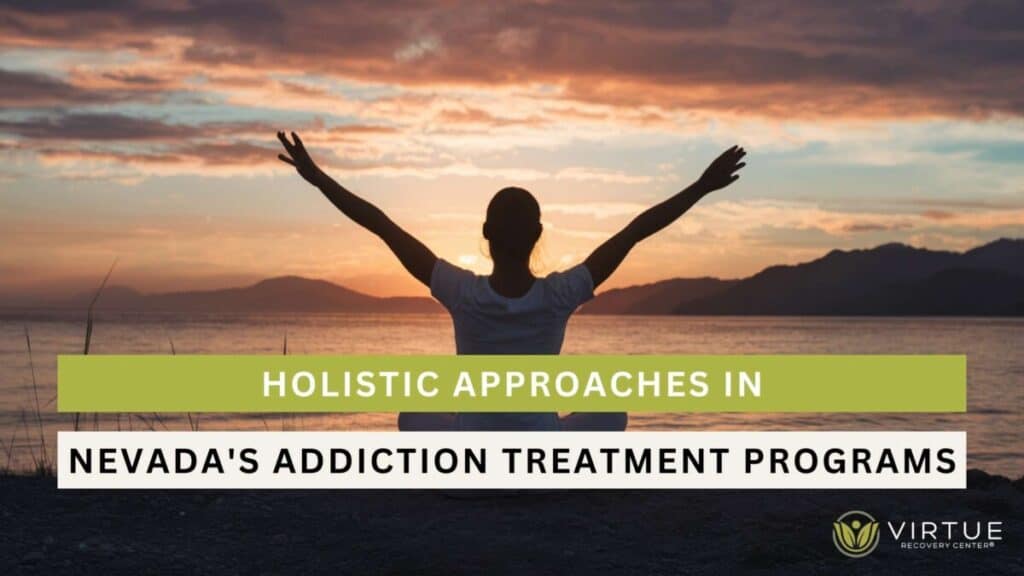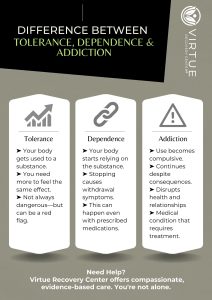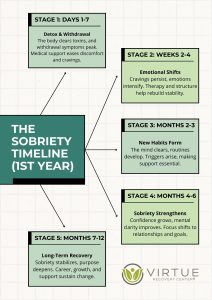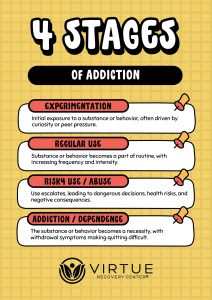Key Takeaways
- Holistic approaches in addiction treatment focus on treating the whole person, not just the substance abuse.
- Nevada’s rehab centers are incorporating holistic therapies to improve treatment outcomes.
- Holistic treatment can address mental health issues and co-occurring disorders alongside substance abuse.
- A comprehensive treatment plan that includes both evidence-based and holistic methods can lead to long-term recovery.
- Family involvement and support are crucial components of successful holistic addiction treatment.
Introduction to Holistic Approaches in Addiction Treatment
In Nevada, addiction treatment programs are increasingly adopting holistic approaches to help individuals overcome substance abuse. These methods aim to treat the whole person, addressing not just the addiction but also the underlying mental health issues and overall well-being. This comprehensive strategy is designed to provide a more balanced and effective path to recovery, promoting long-term health and stability.
The Importance of Holistic Treatment in Rehab Programs
Addressing the Whole Person with Holistic Addiction Treatment
Holistic treatment in addiction recovery goes beyond addressing the physical symptoms of substance abuse. It focuses on healing the mind, body, and spirit, recognizing that addiction impacts every aspect of a person’s life. This approach includes a variety of therapies that work together to support overall well-being.
Benefits of a Comprehensive Treatment Plan
A comprehensive treatment plan that integrates holistic methods can lead to more effective and lasting recovery. By combining traditional evidence-based therapies, such as cognitive behavioral therapy (CBT), with holistic practices like mindfulness and yoga, individuals can develop better coping mechanisms and improve their mental health. This blend of treatments addresses both the symptoms and the root causes of addiction.
Holistic Therapies in Nevada’s Rehab Centers for Substance Use Treatment Programs
Mindfulness and Meditation for Substance Abuse Treatment
Mindfulness and meditation are key components of holistic addiction treatment. These practices help individuals stay present and manage stress, reducing the urge to use substances as a coping mechanism. By cultivating awareness and calm, mindfulness can significantly enhance the recovery process.
Yoga and Physical Exercise for Substance Use Disorder
Yoga and other forms of physical exercise are crucial in holistic therapy. Regular physical activity helps reduce stress, improve mood, and boost overall physical health. Yoga, in particular, combines physical movement with breath control and meditation, offering a holistic way to support recovery.
Nutritional Therapy in The Holistic Treatment Program
Nutritional therapy is another vital aspect of holistic treatment. Proper nutrition can help repair the body from the damage caused by substance abuse and improve mental health. A balanced diet supports physical healing and provides the energy needed to fully engage in recovery.
Integrating Evidence-Based and Holistic Treatments
Cognitive Behavioral Therapy (CBT) and Holistic Methods
Integrating CBT with holistic methods creates a powerful treatment combination. CBT helps individuals understand and change the thought patterns that contribute to their addiction, while holistic therapies address the physical and emotional aspects of recovery. This dual approach ensures a more comprehensive treatment experience.
Group Therapy and Support Systems
Group therapy is an essential part of many addiction treatment programs. When combined with holistic practices, group therapy can enhance the sense of community and support. Sharing experiences and practicing holistic techniques can strengthen bonds and provide additional motivation for recovery.
Dual Diagnosis Treatment
Many individuals with addiction also suffer from co-occurring disorders. Dual diagnosis treatment that incorporates holistic approaches can effectively address both the addiction and the mental health issues simultaneously. This integrated treatment is crucial for individuals struggling with multiple challenges.
Benefits of Holistic Addiction Treatment in Nevada
Improved Mental Health and Well-being
Holistic addiction treatment significantly improves mental health and overall well-being. By addressing the emotional and psychological aspects of addiction, holistic therapies help individuals build resilience and develop healthier coping strategies.
Enhanced Coping Mechanisms
Holistic approaches teach individuals new ways to manage stress and emotions. Techniques such as meditation, yoga, and mindfulness provide practical tools for coping with triggers and cravings, reducing the likelihood of relapse.
Reduced Relapse Rates
Studies have shown that holistic treatment can lead to lower relapse rates. By treating the whole person and providing a variety of therapeutic options, individuals are better equipped to maintain their sobriety and achieve lasting recovery.
Customized Treatment Plans for Specific Needs
Tailoring Treatment to Individual Needs
Every individual’s journey to recovery is unique. Holistic addiction treatment programs create customized plans that cater to each person’s specific needs. This personalized approach ensures that all aspects of the individual’s health and well-being are addressed.
Incorporating Family Therapy
Family therapy is a critical component of holistic addiction treatment. Involving family members in the recovery process helps rebuild trust and improve communication. It also provides a support system for the individual, essential for long-term recovery.
Long-Term Support and Aftercare
Holistic treatment programs emphasize the importance of long-term support and aftercare. Continuous engagement in holistic practices and access to support groups can help individuals maintain their recovery and prevent relapse.
Seeking Help and Starting the Recovery Journey
Finding the Right Treatment Center in Las Vegas
Choosing the right treatment center is a crucial step in the recovery journey. Look for facilities that offer a blend of evidence-based and holistic therapies. Virtue Recovery in Las Vegas provides comprehensive addiction treatment programs that cater to each individual’s unique needs.
Importance of a Supportive Environment
A supportive environment is vital for successful recovery. Treatment centers that foster a nurturing and inclusive atmosphere help individuals feel safe and understood, essential for healing.
First Step Towards Recovery to Begin Holistic Addiction Treatment
The recovery journey can be daunting, but taking the first step is crucial. Reach out to a treatment center, like Virtue Recovery in Las Vegas, to learn about the available programs and how they can be tailored to meet your specific needs. Seeking help is the first and most important step towards a healthier, addiction-free life.
Conclusion
Integrating holistic approaches into addiction treatment programs in Nevada offers a comprehensive path to recovery. By addressing the whole person and combining evidence-based therapies with holistic practices, individuals can achieve lasting recovery and improved overall well-being. If you or a loved one is struggling with addiction, give us a call at 866-520-2861.
FAQs
What is holistic addiction treatment?
Holistic addiction treatment focuses on treating the whole person, including the mind, body, and spirit, using a variety of therapeutic practices.
How do holistic therapies enhance addiction recovery?
Holistic therapies enhance recovery by providing tools to manage stress, improve mental health, and address the root causes of addiction.
Can holistic treatment be combined with traditional therapy methods?
Yes, holistic treatment can be effectively combined with traditional evidence-based therapies like CBT to create a comprehensive treatment plan.
What should I look for in a holistic treatment center in Nevada?
Look for a treatment center that offers a blend of holistic and evidence-based therapies, has a supportive environment, and provides personalized treatment plans.
How does family therapy contribute to addiction recovery?
Family therapy helps rebuild trust, improve communication, and provide a support system for the individual in recovery, enhancing the overall treatment outcomes.
What is the difference between MAT and MOUD?
Medication-Assisted Treatment (MAT) involves the use of FDA-approved medications, combined with counseling and behavioral therapies, to treat substance use disorders. Medications for Opioid Use Disorder (MOUD) is a specific subset of MAT focused on treating opioid addiction with medications like methadone, buprenorphine, and naltrexone, within a comprehensive substance abuse treatment plan.
How effective is holistic treatment for addiction?
Holistic treatment for addiction, which includes therapies like acupuncture, yoga, meditation, and nutritional counseling, can be highly effective as part of a comprehensive rehab treatment plan. These therapies address the physical, mental, and emotional aspects of substance use disorders, helping individuals to overcome addiction and maintain long-term recovery when combined with traditional treatment services.
Are holistic therapies covered by insurance?
Coverage for holistic therapies in substance abuse treatment varies by insurance provider and policy. While some residential treatment programs and drug rehab centers may offer holistic therapies as part of their services, it is essential to check with your insurance provider to understand what treatments are covered under your plan.
How often is dual diagnosis a factor in addiction treatment?
Dual diagnosis, which refers to the co-occurrence of a substance use disorder and a mental health condition, is a significant factor in addiction treatment, with studies indicating that around 50% of individuals with substance use disorders also have a mental health disorder. Effective treatment services for drug and alcohol addiction often need to individualize care to address both the substance use and the underlying mental health issues to achieve successful outcomes.













